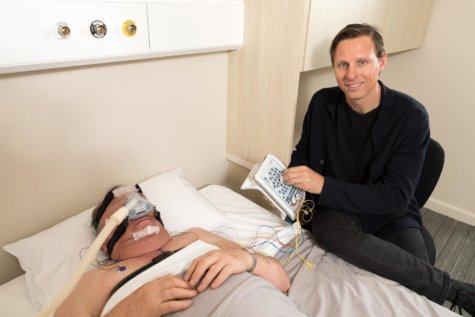ADELAIDE, Australia — Two pre-existing medications may provide an effective way for sleep apnea sufferers to get better sleep. According to new research, the drugs reboxetine and butylbromide appear to reduce the severity of the condition by at least 30 percent.
Sleep apnea is incredibly common and interrupts the sleep habits of millions each and every night. Characterized by the upper airway leading to the back of the nose to the throat closing repetitively while asleep, sleep apnea ultimately restricts oxygen intake, causing people to wake frequently throughout the night. Particularly bad cases of sleep apnea can even lead to awakenings as often as 100 times or more per hour.
Moreover, people who choose to ignore their sleep apnea are often at a higher risk of various health issues including cardiovascular disease, dementia, and depression. Those who stay untreated are even two to four times more likely to get in a car accident than the general population.

Scientists at Flinders University in Australia have been working on ways to treat and beat sleep apnea for close to three decades, but there still is not a single approved drug therapy for the disorder. So, Danny Eckert, director of the Adelaide Institute for Sleep Health at Flinders, decided to try “re-purposing” two existing meds for sleep apnea.
The two drugs, reboxetine and butylbromide, have already shown in previous non sleep apnea-related research the ability to keep muscles active during sleep and assist with breathing. Study authors used a number of recording instruments to measure whether either drug could help relieve severity and symptoms. More specifically, researchers looked to see if the drugs balanced muscular electrical activity around the airway, prevented the throat from collapsing while sleeping, or improved the carbon dioxide regulation and breathing during sleep.
Results indicate both medications indeed increase muscle activity around the airways. The drugs lowered sleep apnea severity among participants by up to a third.
“Almost everyone we studied had some improvement in sleep apnea,” Eckert says in a press release. “People’s oxygen intake improved, their number of breathing stoppages was a third or more less. We were thrilled because the current treatment options for people with sleep apnea are limited and can be a painful journey for many.”
Moving forward, this work will help scientists refine the types of medications with the potential to treat sleep apnea.
“Next, we will look at the effects of these and similar medications over the longer term. We will assess whether we can harness the benefits of one drug without needing to use them both,” Prof. Eckert adds. “Equally, we will test whether these treatments can be combined with other existing medications to see if we can improve their efficacy even more,”
The study is published in the Journal of Physiology.
